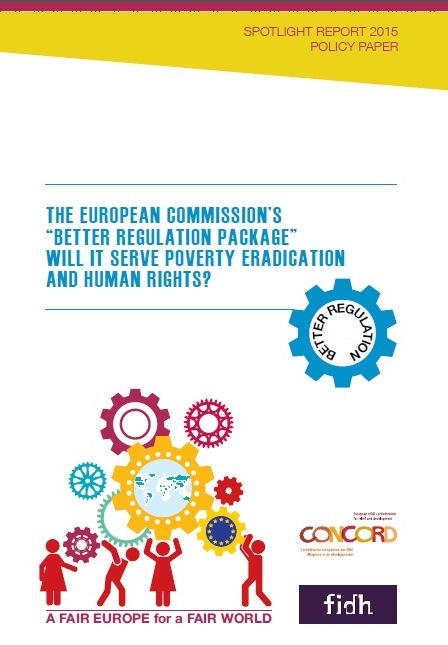Decision-making processes are critical vehicles to advance human rights and global development agendas. From the early consultation step to the ultimate policy evaluation phase, the question of the impacts of the European Union on poverty in developing countries and on human rights must be properly addressed, with the view to avoid negative effects.

With the adoption of the “Better Regulation package” in May 2015, the European Commission has committed to “deliver better rules for better results” and to design EU policies and laws that achieve their objectives at minimum cost.1 With this goal in mind, it brought forward a series of new or reviewed tools and procedures for decision-making.
Those tools could have set out more compellingly that whatever the measure or policy, due consideration must be paid to the impacts on people living in poverty in developing countries, as well as on human rights. In addition, the proposals involve an increased risk of dominance of the EU decision making process by the private sector interests.
This policy paper outlines CONCORD and FIDH recommendations to ensure that regulating better means prioritising human rights and the fight against poverty and inequality in decision-making.
Key Recommendations to the European Commission:
• Take human rights, including economic and social rights more seriously into account in all impact assessments. Systematically consider and thoroughly investigate the impact on people living in poverty in Europe and in developing countries.
• Have an ambitious regulatory agenda that goes beyond the preservation of the acquis of European social and environmental laws because the global challenges we face today – climate change, unfair tax practices, improving social and human rights protection – all require concerted action and so much more must be done to make Policy Coherence for Development and the realisation of human rights a reality.
• Systematically consult human rights organisations at an early stage of the policymaking process.
• Ensure that the Regulatory Scrutiny Board pays special attention to the justification and evidence provided when an Impact Assessment states that there are no negative impacts on poverty eradication in developing countries or human rights.
• Put in place stronger safeguards and mechanisms to better balance out stakeholders’ representativeness and specifically avoid the dominance of the private sector in public consultations. Make sure that public interest and human rights always prevails over private interests.
• Guarantee that there is specific in-house expertise on human rights and development on the Regulatory Scrutiny Board, with a view to ensure compliance of Impact Assessments with Policy Coherence for Development and human rights obligations.
• Ensure that potentially affected local communities’ perspectives are reflected in Impact Assessments, when relevant.
